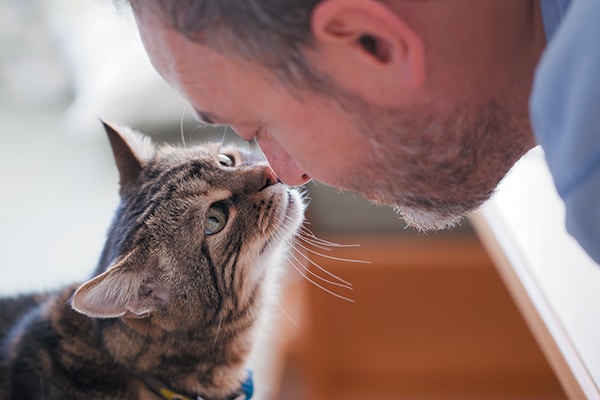You see, some cats have naturally drier noses than others, and the temperature and humidity levels of most cats' noses vary throughout the day. Therefore, one of the best ways for us humans to decide whether or not to worry is to know what is the normal "state of the nose" for our kittens.

Why do cats have wet noses?
The skin around the nostrils is called the rhinarium, and the sweat glands in the rhinarium create moisture. The inner tear duct also creates drainage which contributes to a wet nose. Humans sweat to regulate their body temperature and a cat can use the moisture from its nose - by evaporation - to achieve the same result.
Cats are meticulous groomers and, by licking themselves, they automatically add a layer of moisture to the nose. Saliva can dry out quickly, but this is one of the reasons why a cat's nose is wet.
A wet cat's nose can also be due to something else simple: the bowl of water. A bowl of clean, clear water can make it difficult for some cats to determine the depth of the liquid. When going to drink, the kitten may inadvertently dip its nose into the bowl, leaving it with a revealing wet nose.
A wet cat's nose versus a dry cat's nose
A dry cat's nose is just as common as a wet cat's nose, and is generally not a cause for alarm. If a cat spends a large part of its time in full sun, it may have a dry nose. It also happens to us humans when we expose ourselves to the sun! A dry cat nose can also appear if a cat spends a lot of time near a non-solar heat source such as a chimney or heating duct.
What other factors can affect a wet cat's nose compared to a dry cat's nose?
The humidity level of a nose is also influenced by the humidity level of the air. This is especially true during the winter months in many places.
The main reason a cat's nose skin is too dry or cracked is dehydration, which is caused by a decrease in water intake or an increase in fluid loss. Consult your veterinarian if you think your cat is dehydrated. Other signs of dehydration in cats include the following:
Sunken eyes
Lethargy
Loss of appetite
Dry mouth
Depression
High heart rate
Panting
The elasticity of the skin
When is a wet cat's nose a cause for concern, and how to treat it?
Ingrid King, a cat expert and certified veterinary journalist, says, "Although people seem to think that a wet nose is a sign of health [and] a dry, warm nose is a sign of illness, that's not true. Cats' body temperature is naturally higher than that of humans, so most of the time a cat will feel warm to the touch".
"A cat's nose can go back and forth between being wet and dry several times a day, depending on the cat's activity", Ingrid continues, "Did your cat just eat or wash? His nose will be wet. Has he been lying in the sun or is the air in your home extremely dry? His nose will be dry. Your cat's nose will only be an indicator of his health if you notice something abnormal, such as peeling skin, bumps or a runny nose".
Is it a wet nose or a runny nose?
A runny nose, unlike a wet cat's nose, can be a concern and should be examined by a veterinarian to rule out diseases such as upper respiratory tract infections (URIs). Various bacterial and viral infections can cause upper respiratory tract infections, including feline herpesvirus and feline chlamydia.
The most common symptoms of upper respiratory infections are as follows:
Excessive nasal discharge
Sniffing and sneezing
Red and watery eyes
Colored and bubbly nasal discharge
A runny nose can also signal an allergy and, after a thorough discussion of the symptoms and daily environment with a veterinarian, can result from simple changes in food, bedding or other environmental factors.
The last word on a cat's wet nose
Here again, a healthy cat's nose generally goes from wet to dry throughout the day. It is important to know your cat's "normals" to be aware of any deviation, whether it is a wet cat's nose or anything else. A sudden change in humidity levels, accompanied by symptoms, can indicate illness, and a veterinarian should examine it.